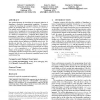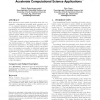612 search results - page 9 / 123 » Hardness assumptions in the foundations of theoretical compu... |
ATAL
2010
Springer
13 years 8 months ago
2010
Springer
We consider the computational complexity of pure Nash equilibria in graphical games. It is known that the problem is NP-complete in general, but tractable (i.e., in P) for special...
SIGSOFT
2007
ACM
14 years 8 months ago
2007
ACM
The standard language for describing the asymptotic behavior of algorithms is theoretical computational complexity. We propose a method for describing the asymptotic behavior of p...
ICS
2010
Tsinghua U.
14 years 5 months ago
2010
Tsinghua U.
: Starting with the work of Ishai-Sahai-Wagner and Micali-Reyzin, a new goal has been set within the theory of cryptography community, to design cryptographic primitives that are s...
STACS
2010
Springer
14 years 2 months ago
2010
Springer
This paper presents the following results on sets that are complete for NP. (i) If there is a problem in NP that requires 2nΩ(1) time at almost all lengths, then every many-one N...
FPGA
2009
ACM
14 years 2 months ago
2009
ACM
Many natural processes exhibit exponential decay and, consequently, computational scientists make extensive use of e−x in computer simulation experiments. While it is common to ...


